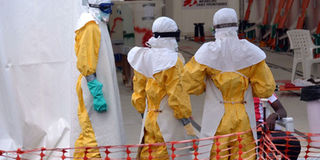Liberian refugees in limbo over plans to end their stay in Ghana

Health workers wearing Personal Protective Equipments (PPE) stand at an Ebola treatment centre in Monrovia, Liberia, on October 27, 2014. The world’s largest outbreak of Ebola began in Guinea earlier this year before spreading across its porous borders into Liberia and Sierra Leone. PHOTO | ZOOM DOSSO |
What you need to know:
- On the sprawling camp’s winding dirt roads, Liberians no longer talk of the civil war that raged from 1989 to 1997 and forced many of them to seek refuge in Ghana.
- Border closures and flight cancellations have blighted economies still struggling with post-civil war rebuilding and facing urgent development needs.
- The exiles talk of families once again torn apart and of familiar faces taken by the disease.
BUDUBURAM, GHANA
Jefferson Karr was ready to return to Liberia. He had wound down the management school he ran in Ghana, given away the computers and planned his trip home.
Now Mr Karr is in limbo, along with many of his compatriots in the Buduburam refugee camp, 35 kilometres west of Ghana’s capital, Accra.
Ebola has killed more than 5,000 people, mostly in Guinea, Liberia and Sierra Leone, and is expected to hit economic growth in the region, as border closures and stigma disrupt the flow of goods and people.
On the sprawling camp’s winding dirt roads, Liberians no longer talk of the civil war that raged from 1989 to 1997 and forced many of them to seek refuge in Ghana.
Instead, they talk of a virus that kills like no other, with nearly 3,000 Liberians among the dead and the west African country having only just lifted a state of emergency imposed three months ago.
“If it had been like the war, we had the opportunity to flee to the Ivory Coast,” said Mr Karr, who lost two uncles in the civil conflict and has been living in Ghana for the past 16 years.
BORDER CLOSURES
The world’s largest outbreak of Ebola began in Guinea earlier this year before spreading across its porous borders into Liberia and Sierra Leone.
The paltry health systems of all three have been overwhelmed, prompting the United States, France and Britain to deploy their militaries and the creation of a UN mission to fight the disease.
Border closures and flight cancellations have blighted economies still struggling with post-civil war rebuilding and facing urgent development needs.
By and large, Liberians are not refugees anymore. Most lost that status in 2012 and many chose to return home, said Tetteh Padi, the programme coordinator for the Ghana Refugee Board.
Only a fraction of those living in the camp were able to prove extenuating circumstances that allowed them to keep their refugee status, he added.
In all, the Ghana Refugee Board is providing support to more than 5,000 Liberians in the camp but there are more who have fallen through the net.
FIVE-DAY JOURNEY
From Buduburam’s entrance, trucks would set off for a five-day journey to Liberia’s capital Monrovia, said Robert Mcintosh, secretary of the Ghana Private Roads Transport Union.
Passenger vans also carried people via Ivory Coast, which separates the two countries.
Now the vehicles sit loaded with merchandise but motionless at Buduburam’s entrance — a testament to the camp’s paralysed economy.
“They carry goods and (are) hoping that they will get there and sell and be able to pay back the money,” Mcintosh said.
“But (it is) a very difficult time for them now, since the borders have been closed between Ivory Coast and Liberia.”
In the camp itself, posters warn against the risk of Ebola, despite Ghana being free from the disease but on its guard against any imported cases.
The exiles talk of families once again torn apart and of familiar faces taken by the disease.
One of the former conductors at Buduburam’s forlorn long-distance bus terminal died of Ebola in Liberia, said James Nuamaha, the stationmaster.
MISSED REPATRIATIONS
After missing the organised repatriations to Liberia, Peter Kaba lives jobless in the camp. Then, he got the news that Ebola had killed his older sister and five other family members.
“I don’t have money to go because I have no money to sustain myself here,” Mr Kaba said.
Mr Karr, too, received bad news from home. The little brother of a best friend from Liberia caught the haemorrhagic fever, which spread to his wife and their four children. The best friend and his wife died, while the children were critically ill.
“I’m highly frustrated with this Ebola issue,” Mr Karr said.
“By now I should have been making impact in Liberia, transforming lives, and then trying to wipe away that illiteracy that is in our country that’s posing us a problem.”
But with the border shut, all he can do is wait.




